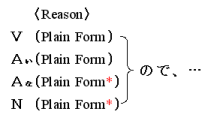ので යන්න それで (Lesson 17-9-1) යන වාක්ය රටාව හා වෙනස්ව, එක් වාක්යකින් හේතුව දැක්වීමේදී යොදාගනි.
* A(な) නාමවිශේෂණ පද හා නාමපද වර්තමාන ඇත අර්ථයෙන්, ので හි ඉදිරියෙන් යෙදීමට පෙර, එහි だ ඉවත් කොට ඊට な එකතු කල යුතුය.

![]() 兄は びょうきに なったので、学校を 休みました。
兄は びょうきに なったので、学校を 休みました。
අයියා අසනීප වූ නිසා, පාසල් නොගියේය.

![]() この テープは だいぶ 古いので、いい 音が しません。
この テープは だいぶ 古いので、いい 音が しません。
මේ ටේප් එක ඉතා පරණ නිසා, හොඳ ශබ්දයක් එන්නේ නැහැ.

![]() 図書室は しずかなので、よく べんきょうが できます。
図書室は しずかなので、よく べんきょうが できます。
පොත් කාමරය නිශ්ශබ්ද නිසා, හොඳින් පාඩම් කල හැකියි.
Lesson 10-7「よく わかりませんから、もういちど 先生に ききましょう。」
හොඳින් නොතේරුන නිසා, තව වරක් ගුරුතුමාගෙන් අසමු.
|
【~ので、それで】【~から、だから】
ので and それで are often followed by a fact or a phenomenon consequent to a
preceding event. They are rarely used with sentences which has the following endings: ×~でしょう (conjecture ; probably~) ×~ましょう (proposal, suggestion ; Lets'~) ×~なさい(imperative ; e.g., Do it.) ×~てください(request ; Please~) etc. On the other hand, から and だから are often used with the above sentence endings. |

